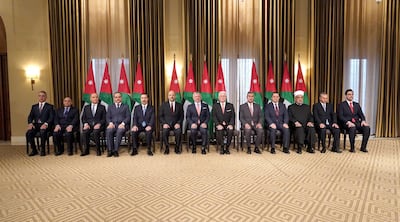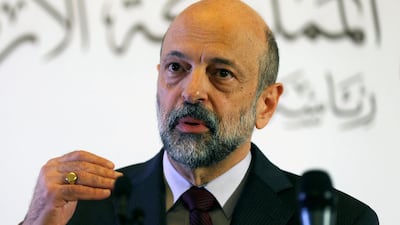Jordan's prime minister reshuffled much of his Cabinet on Thursday, appointing a former palace adviser as finance minister as he pursues efforts to slash the country's debt under a tough economic reform programme.
The reshuffle was Omar Razzaz's fourth since taking office almost a year and a half ago. It affected 11 ministries in all but left other incumbents, notably the foreign affairs and interior ministers, unchanged.
As finance minister he brought in Mohammad Al Ississ, a Harvard-educated economist and former palace adviser, in place of Ezzedin Kanakriyah.
Mr Al Ississ, who had been serving as planning minister, will lead a team overseeing the economic programme that Jordan agreed with the International Monetary Fund in 2016 and has since been slow in implementing.

Mr Razzaz has defended the IMF-backed reforms, saying Jordan can no longer afford a bloated public sector whose salaries eat up the $13 billion (Dh47.8bn) budget while the economy groans under a record public debt of about $40bn.
The reforms will seek to gradually cut public debt now at 94 per cent of GDP.
The IMF said earlier this year that delays in implementing the reforms would undermine Jordan's ability to push growth well beyond an average 2 per cent – where it has been stuck for years – to reduce poverty and youth unemployment, which has risen to 19 per cent.
Economists and analysts say low growth and insufficient job creation are the kingdom's two main problems.
"There are mounting challenges to boosting growth essential to reducing societal tensions and high unemployment. These challenges are tough with no quick fixes in the short term," said Ibrahim Saif, a former planning minister who heads Jordan Strategy Forum, a think-tank.
Mr Al Ississ will also oversee completion of the 2020 budget, which officials expect will involve significant spending cuts alongside a stimulus package to boost business confidence.
Jordan's cash-strapped state finances have been brought under pressure in recent months by government moves to raise the salaries of teachers and army retirees even as state revenues dwindle.
Officials have said Jordan is expected to ask the IMF for more time to implement the reform programme, which last year triggered the biggest demonstrations in years when tax hikes pushed by the IMF came into effect.
The protests showed that pushing the debt-burdened country to live beyond its means risked major instability, and the same worries are resurfacing if the IMF insists on more austerity measures in coming talks this month, officials say privately.
King Abdullah appointed Mr Razzaz in the summer of 2018 with a brief to defuse the protests, and the premier has sought to revive confidence in a country where many blame successive governments for failing to deliver on pledges to revive economic growth, cut waste and curb corruption.
The economy has also been hit by conflict in the Middle East, which has weighed on investor sentiment.

